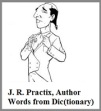Deed: (n) document executed under, especially of real estate.
Strange bugaboos crawl out of the natural events of our lives and haunt us for all time. They are difficult to describe and don’t seem to have any particular reason for existence.
But because our journey took us through a side street filled with trash cans and rats, we have this memory of sleaze.
It’s that way for me with the word “deed.”
Many years ago, my brothers discovered a deed to a property that my father had once owned. We thought he had sold it, but now it appeared that the papers were never actually signed.
Or maybe they were, and we just didn’t know where to find them.
It became the subject of conversation for months and months to come, as each of my siblings imagined how much money was possibly floating in the air from this deed, that could come and land on their lives and produce everlasting joy.
They were surprised at how unimpressed and uninvolved I was.
So sure was I that this mission was folly that I signed over my portion of the mystical magical amount, letting them know to leave me alone and to never use the word “deed” in my presence again.
I will honestly tell you that I do not know the end of this story. Eventually, each one of my “Grimm brothers” gave up the cause and never brought it up again, I assume out of fear of looking as if each of them had failed.
So my lesson in this essay is simple:
If you’re waiting for a deed to bring you happiness, you might find it more powerful to see if you can take your own deeds to do so.




